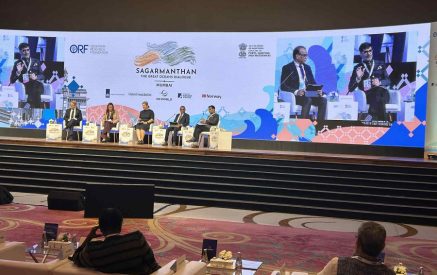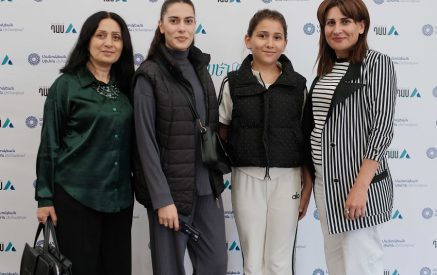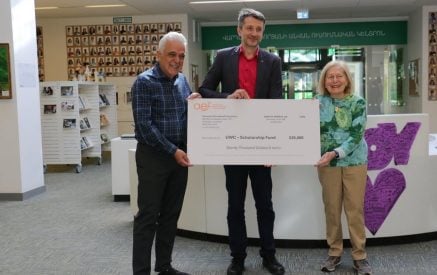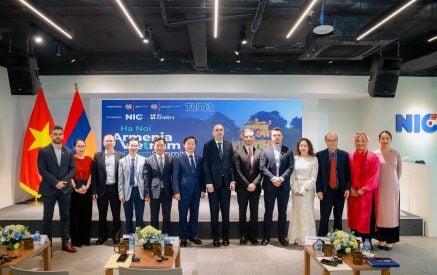by Aram Arkun
WATERTOWN — Vicky Kherlopian gave a lecture about education in Armenia today in both Armenian and English, accompanied by PowerPoint slides, on April 3 at the Baikar Center in Watertown. Her particular focus was the work of EduArmenia in Armenia. The talk was sponsored by the Tekeyan Cultural Association (TCA) Boston Chapter.
Kherlopian based her presentation on the five years of work she has done with EduArmenia. She said, “After teaching all these years in public schools, understanding what teaching is all about, from kindergarten to high school level, I thought that it is my duty to train educators in Armenia and help my Armenian motherland in the best way possible.”
Read also
In the public sphere of education, Kherlopian noted that the Armenian government in recent years has introduced reforms attempting a transition to a competency-based curriculum fostering critical thinking, creativity and problem-solving from the old rote memorization approach, together with teacher development programs, renovation of school buildings and integration of technology into classrooms.
EduArmenia, she said, is a program of volunteer Armenian lecturers and teachers globally to promote education in Armenia. It organizes free training for people in the fields of education and science in Armenia so that current achievements in the academic system globally can be implemented also in Armenia. Thus it promotes professional development there, educational reform, and a reservoir of educational scientific resources. It also establishes experimental centers in Armenia.
The two founders of the organization are Lilit Mukurtchyan, who works as a member of the Armenian Ministry of Education, and Seda Kocharyan, who currently is an educator in Germany. Kherlopian presented a brief video message from the two of them in Armenian. Kocharyan said that when they began EduArmenia (in 2017), the two of them were ordinary teachers in Armenia who sought to solve many of the problems of the educational system and sought the opinions of their fellow teachers for this purpose. Mukurtchyan mentioned the annual international pan-Armenian conferences conducted over the last four years which brought together educators, scholars and administrators and whose recordings are available on the EduArmenia website.
EduArmenia offers both free online university lectures and a lab school platform allowing collaborative planning, sharing of educational experience and professional development. Mukurtchyan mentioned several popular programs, such as “Zoom-drinking,” which are informal meetings and discussions on Zoom over a cup of tea or coffee, and preservation of Armenian identity through traditional holidays like Easter, Vartavar or Hampartzoum.
Kherlopian then continued her talk, mentioning some of the topics of her own 45 presentations over the past five years. She said that there is a steering committee of EduArmenia in the United States with representatives from different areas. In addition to herself, she said it is composed of Marineh Fstkchyan Khachadour, who teaches in the Pasadena Unified School District in California; Flora Keshishian, researcher, public speaker, and writer (in New York); Karine Armen (Kurkjian), a psychologist and teacher in Glendale, California, who has done many presentations on how to accept Karabakh students in Armenia’s public schools (and is a contributor to the Armenian Mirror-Spectator too); Yeprem Mehranian, an associate professor of education at Georgia College in the United States; and Araksya Ghukasova, head expert of a language teaching committee and an English language teacher in Moscow, Russia.
Kherlopian pointed to Visual Armenia, as a good example of using new technology in Armenian public schools to excite and encourage students to learn. Visual Armenia developed the program Ashkharhatsuyts, literally “world view,” which through an interactive map provides students information about specific events and locations in different parts of the world.
She noted that the Armenian government in 2023 fully renovated or built 29 schools and 167 kindergartens while in the following year 264 schools were to be worked on. Laboratories and IT resources are being included in the schools encompassed in this effort, she said.
Kherlopian concluded by stressing that a focus on collaboration, communication, creativity and critical thinking are necessary to prepare students for increasingly complex life in the 21st century.
Kherlopian recognized the presence of EduArmenia member and Bentley University professor Tamara Babaian in the audience. A lively question-and-answer session covered topics such as improvements in education in the rural areas of Armenia (with the government providing salary incentives to teachers there), language and social adjustment difficulties for students from Artsakh, the approach of the Ministry of Education to reforms proposed by EduArmenia volunteers, STEM education in Armenia, .
TCA of the US and Canada Executive Director Aram Arkun served as the master of ceremonies and at the start of the program introduced Kherlopian as a Boston University Field Supervisor who supervises teacher candidates for Elementary Education Certification and Bilingual/ELL teaching certification. She has played a key role in accreditation of schools, presenting professional development courses and workshops, engaging in curriculum development projects within school systems and educational publishers and private institutions.
Kherlopian was chosen as a distinguished mathematics teacher to be awarded as the Massachusetts Presidential Award Finalist (1997), for Best Elementary Level Mathematics Teacher. A veteran K-5 public school teacher, as well as a Bilingual/ELL Specialist (K-12), she has taught for 38 years. In Watertown Public Schools she fully engaged the students, faculty, community, parents and administrators preparing schoolwide cultural events promoting diversity under her leadership. At the secondary level Vicky taught ELL (English Language Learners) at Belmont High School for the last ten years after retiring from full time teaching.
At the end of the evening, Arkun called the attention of the audience to TCA’s Sponsor A Teacher Program which continues after several decades to support teachers in Armenia and is also an effort worthy of patronage and promotion.

























































